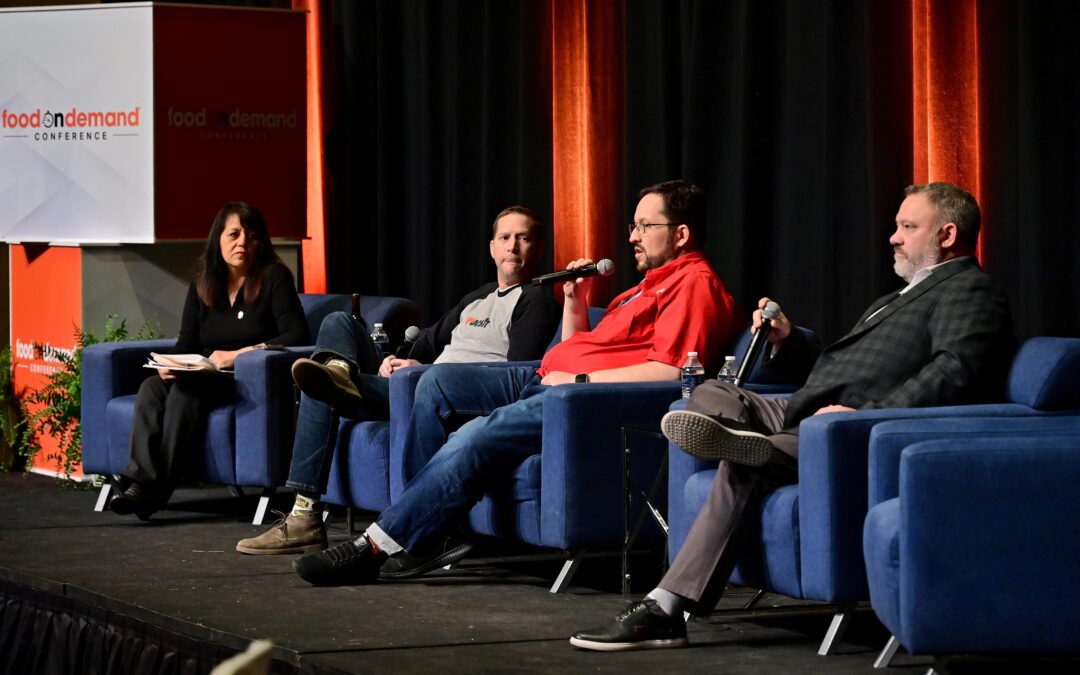Delivery service from third-party providers is a convenient option for consumers and another revenue stream for restaurant operators. However, it’s also come with its set of challenges, including one that is financially impacting restaurants.
Across the industry, 2.5 to 3 percent of an operator’s total revenue is getting caught up in third-party delivery service disputes that lead to chargebacks. The concerning statistic was provided by Chris Munz, president of growth at the restaurant technology company Voosh during a Food on Demand Conference panel last week about the issue and potential fixes.
Leading the conversation was moderator Nancy Luna, contributing writer to Food On Demand. Joining Munz on stage was Sean Thompson, vice president of information technology at Freddy’s Frozen Custard & Steakburgers, and Jeff Barney, vice president of franchise development at Nekter Juice Bar. During the session, neither held back with their firsthand accounts on the chargeback matter.
“The term chargeback is a misnomer,” Thompson said. “It’s not a chargeback. It’s refund requests, and we know there are times that there’s a mess-up on our end where the guest genuinely deserves cash back. But we also know what’s really happening out there. We know how people have learned to game the system and eat food for free.”
“Even the term refund request is somewhat wrong, too,” Barney said. “It’s more of a refund decree, because we have no power over it.”

Sean Thompson, Freddy’s Frozen Custard & Steakburgers VP of information technology
Thompson recalled a recent example of a Freddy’s chargeback of an order over $100. After investigating, Thompson said the refund was because the delivery driver forgot the drinks.
“I said to [the delivery service provider] ‘Don’t make your problems my problems,’” Thompson said. “The delivery driver forgot the drinks and the answer from the provider is that we should refund the person $100? Ridiculous.”
After doing a deep dive on their company data, Thompson said it happens rarely in some markets while others see chargebacks on a regular basis. In those areas, Thompson said there’s an average of 1.5 to 2 percent of orders producing refund requests.
“In a game where margins are always so thin for everything we do, plus having the third-party element, a hit of 1.5 to 2 percent, that’s not cool,” Thompson said. “We have operators who are smashing it, who know how to run a restaurant, and they’re being took when it comes to this. It’s not chargebacks, it’s really just theft.”
In addition to the fiscal impact, Barney said the refund requests are also time-consuming for operators.
“We’re spending hours a week on these, depending on seasonality, but the scary this is that our operators don’t have time to deal with all of these,” Barney said. “We can take a few blows on the corporate side and be OK. But they don’t have the time and sometimes not the awareness.
“I have owners who’re working the store, handing drinks out and talking to guests,” Barney continued. “For them to spend time in the middle of being with their team and customers on this is absurd.”
Helping restaurants resolve their chargeback troubles is one of the services Munz said Voosh provides. During the panel, Munz said the company works with 25 brands and has a win rate of between 80 and 90 percent when it comes to refund requests.

Chris Munz, Voosh president of growth
“We identify a dispute or a challenge and then automate the entire filing process, seeing it all the way through to completion,” Munz said. “It’s automated, saves time and gets money back.
“One of the brands we work with is &pizza and they do quite a bit of volume from delivery as a pizza chain, and they have a large amount of disputes,” said Munz. “Since we’ve partnered, on average, they’re getting back $10,000 to $15,000 a month across their stores, and the time saved is also worth its weight in gold.”
Thompson said Freddy’s has a partner of its own in the company Loop AI, which is helping recoup more than $1 million a year.
“It helps us reinvest and the automated process produces data, which we can also give to our operators, because they also love the opportunity to get better,” Thompson said.
“This way, we can filter out the nonsense, and we can let them know the actual opportunities where they can improve.”
Barney said Nekter Juice Bar is earlier on its journey to navigate the issue, but said it began working on the issue by revamping its entire tech stack and automating more of its systems with help from its partner Qu, a restaurant technology company.

Jeff Barney, Nekter Juice Bar VP of franchise development
Despite the challenges, though, both restaurant representatives acknowledged that the third-party delivery apparatus is necessary.
“The guests have spoken,” Thompson said. “They’ve told us that they want the convenience. I want to be able to provide that convenience to the guests willing to pay for it.”
“The fact is innovation brings challenges,” Barney said. “If it doesn’t, then it’s not working right. Today it’s this, and it’s what we’re all talking about. But tomorrow’s technology, whether it’s dynamic pricing or any of the other things in our community, will bring a new set of challenges.
“But we’re a resilient community here,” said Barney. “I think the recent years have shown that. When we get a curveball, we can work through it. So, if we just stopped using DSPs, would some headaches go away? Sure, but it would be replaced with something else.”


